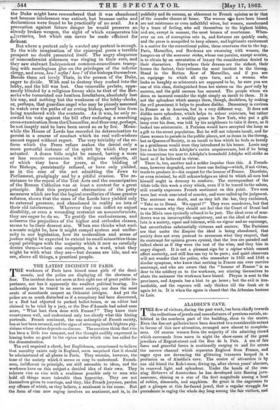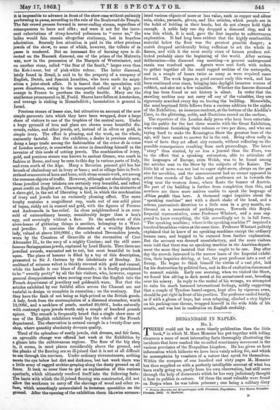ALADDIN'S CAVE.
THE flow of visitors, during the past week; has been chiefly towards the collections of jewels and manufactures of precious metals, ex- hibited in the southern part of the building, close to the centre. Even the fine-art galleries have been deserted to a considerable extent in favour of this new attraction, arranged now almost to complete- ness. Of course women form the majority of the admiring crowd which surrounds from morn to night the show-cases of the great jewellers of Regent-street and the Rue de la Paix. A. sea of fair faces and graceful forms is continually surging to and fro across the narrow channel which separates England from France, and eager eyes are devouring the glittering treasures heaped in a .profusion as of Aladdin's cave. The centre of attraction is by our old friend the Koh-i-noor, diving up, after eleven years' absence, in renewed light and splendour. Under the hands of the cun- ning Hebrews of Amsterdam he has developed into flaming juve- nescence, shining as a star of the first magnitude among a host of rubies, diamonds, and sapphires. So great is the eagerness to get a glimpse at this far-famed jewel, that a regular struggle for precedence is raging the whole day long among the fair visitors, and it is impossible to advance in front of the show-case without patiently performing la queue, according to the rule of the Boulevard du Temple. The fair crowd presses forward in never-ending stream, regardless of consequences to laces and silks ; and were it not for the inces- sant exhortations of stony-hearted policemen to " move on," the ladies would fain remain altogether stationary, lost in hopeless admiration. Scarcely less attention is paid to the other precious jewels of the show, to none of which, however, the tribute of la queue is rendered. But an incessant fire of burning eyes is di- rected on the Nassack diamond, one of the prizes of the Mahratta war, now in the possession of the Marquis of Westminster, and on another stone, called "the Star of the South," larger even than the Koh-i-noor, but of pink-white colour. The latter diamond, lately found in Brazil, is said to be the property of a company of English, Dutch, and Spanish Israelites, who have made its acqui- sition a joint-stock affair. It is feared that the speculation will prove disastrous, owing to the unexpected refusal of a high per- sonage in France to purchase the costly bauble. Many are the anathemas pronounced on M. Fould. Shares have fallen at Amsterdam, and courage is sinking in Houndsditch ; lamentation is general in Israel.
Precious stones of lesser size, but attractive on account of the new simple garments into which they have been wrapped, draw a large share of visitors to one of the trophies of the central nave. Under a huae pyramid of iron and glass are shown some beautiful dia- monds, rubies, and other jewels, set, instead of in silver or gold, in simple ivory. The effect is pleasing, and the work, on the whole, eminently tasteful. But the exhibitor, a dealer in precious stones, doing a large trade among the fashionables of the creme de la creme of London society, is somewhat in error in describing himself as the inventor of this mode of setting jewels. The combination of ivory, gold, and precious stones was known to ancient Greece, was much in fashion at Rome, and may be seen to this day in various parts of Italy, and even north of the Alps. Many a Bavarian peasant girl has her brooch of chalcedony set in ivory or bone; and at village fairs in Swit- zerland ornaments of horn and bone, with stone mosaic work, are among the common objects of traffic. However, although not absolutely new, these jewelled ivory trinkets are certainly very beautiful, and reflect great credit on English art. Charming, in particular, is the statuette of a slave-girl, in the act of liberating a bird, in which the combination of ivory and jewels has an eminently pleasing effect. The same trophy contains a magnificent cup, made out of one solid piece of topaz, richly set in enamel and gold, with the figures of Perseus and Andromeda in bas-relief. In close neighbourhood is an eme- rald of extraordinary beauty, considerably larger than a hen's egg, and seemingly without a flaw. To the south-west of this store-house of glittering things is another, belonging to a West- end jeweller. It contains the diamonds of a wealthy Hebrew lady, valued at above 100,0001. ; the celebrated Devonshire jewels, worn by the Countess of Granville at the coronation of Czar Alexander II., to the envy of a mighty Czarina; and the still more famous Seringapatam jewels, captured by Lord Harris. Then there are jewelled swords, warranted not to cut, but most beautiful to look upon. The place of honour is filled by a toy of this description, presented to Sir J. Outram by the inhabitants of Bombay. Its scabbard of crimson velvet is thickly covered with gold and enamel, while the handle is one blaze of diamonds; it is loudly proclaimed to be " sweetly pretty" by all the fair visitors, who, however, express general disappointment when moving over from the English into the French department of jewellery and goldsmith ware. Not that the articles exhibited by our faithful allies across the Channel are not tasteful in design or complete in execution : on the contrary. But they have the fault of not being as high-priced as the British goods. A lady, fresh from the contemplation of a diamond stomacher, worth 15,0001., and a necklace of pearls, marked 20,0001., looks naturally with contempt upon jewels worth only a couple of hundred pounds apiece. The remark is frequently heard that a single show case of one of the English exhibitors would buy the whole of the French department. The observation is natural enough in a twenty-four acre shop, where quantity absolutely devours quality.
Tired of the splendour of costly jewels, rich dresses, and fair faces, an agreeable change was offered last week at the Exhibition by a glance into the subterranean regions. The floor of the big shop is, it seems, in most places considerably above the ground, and the planks of the flooring are so ill joinedthat it is not at all difficult to see through the crevices. Under ordinary circumstances, nothing meets the eye below but dirt and darkness, but last week there was a little army of ragged urchins groping along the dusty ground on all fours. It took us some time to get an explanation of this curious spectacle, which ultimately resolved itself into the following facts : The haste with which the ill joinedflooring was constructed, did not allow the workmen to carry off the shavings of wood and other re- fuse, which accordingly accumulated in immense quantities on the ground. After the opening of the exhibition there likewise accumu, lated various objects of more or less value, such as copper and silver coin, sticks, parasols, gloves, and like articles, which people are in the habit of holding in their hands, but do not always hold tight enough. A noble lady one day dropped a diamond ring, and it was this which, it is said, gave the first impulse to subterranean exploration. It had long been evident that the highly combustible material below the floor was the greatest possible danger; a match dropped accidentally being sufficient to set the whole in flames, and with it the most costly store of human produce col- lected probably since the beginning of the world. After serious deliberation—the diamond ring assisting—a general underground razzia was resolved upon. Agents were sent forth with orders to gather together all the small ragged urchins of the metropolis, and in a couple of hours twice as many as were required came forward. The work began in good earnest early this week, and has been continued ever since, bringing into daylight immense masses of rubbish, and also not a few valuables. Whether the famous diamond ring has been found or not history is silent. In order that the crawling urchins may not carry off any of the valuables, they are rigorously searched every day on leaving the building. Meanwhile, the mud-begrimed little fellows form a curious addition to the sights of the Exhibition, an immense contrast, at the bottom of the Aladdin's Cave, to the glittering, noble, and illustrious crowd on the surface.
The reporters of the London daily press who have been entertain- ing the public for the last three months with the Great Exhibition, who continue furnishing their column or two per diem, and who are trying hard to make the Kensington Show the greatest bore of the age, will have much to answer for in the end. Being often sadly in want of facts they set afloat airy canards, without reflecting on the possible consequences resulting from such proceedings. The latest "story" thus started, by no less a journal than the Times, was to the effect that a speaking automaton, able to articulate all the languages of Europe, even Welsh, was to be found among the articles sent to the Show by the subjects of the Kaiser. The little bit of news was not lost to eager sight-seers, always on the qtd sire for novelties, and the announcement had no sooner appeared in print than crowds of fine ladies and gentlemen set in towards the wing near the western dome, where floats the banner of Austria. No part of the building is further from completion than this, and nowhere are there more natives unable to speak the language of Albiox perftde than here. A thousand eager inquiries about the "speaking machine" met with a dumb shake of the head, and a solemn pantomimic direction to a little man in a grey mantle, en- throned on a mountain of packing-cases. Towards this Royal- Imperial representative, some Professor Whatnot, and a man sup- posed to know everything, the tide accordingly set in in full force. " The speaking machine ; where is the speaking machine r inquired a hundred breathless voices at the same time. Professor Whatnot politely explained that he knew of no speaking machines except the ordinary human ones, and begged to be excused from further explanation. But the account was deemed unsatisfactory, and the more visitors were told that there was no speaking machine in the Austrian depart- ment the more they insisted that there ought to be one. Day after day the crowds increased in the narrow lanes of the Imperial exhibi- tion, their inquiries driving, at last, the poor professor into a sort of frenzy. He began to think himself the victim of a vast plot, laid for his destruction by political foes, and in fits of exaltation threatened to commit suicide. Early one morning, when we visited the Show, we found him sitting in dark mood at his accustomed seat, brooding over his misery. In reply to the recital of his wrongs, we attempted to calm his much harassed international feelings, mildly suggesting that a couple of Tyrolese barrel-organs, kept alive by vigorous arms, should be put right in front of his position. The professor smiled faintly, as if with a gleam of hope, but soon relapsing, climbed a step higher on his packing-case throne, wrapped himself in the wide folds of his mantle, and was lost in meditation on English oredulity.































 Previous page
Previous page